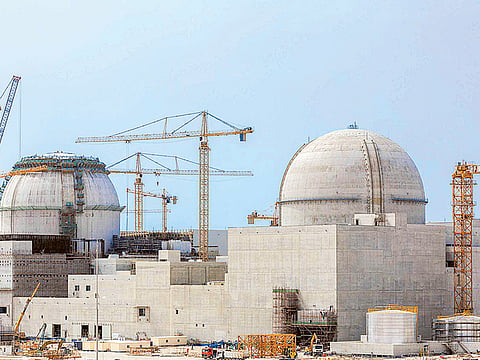UAE nuclear power focused on safety
Study of nuclear accidents such as in Japan in 2011 helping create stronger, safer nuclear power plant

Abu Dhabi: Revised UAE nuclear power safety measures prompted by the Japanese nuclear disaster five years ago will bolster the Western Region’s Barakah nuclear power plant’s capacity to withstand extreme events after its first of four reactor units goes online next year, officials said.
Stricter measures stem from a UAE review following the catastrophic failure of the Japanese Fukushima Daiichi nuclear power plant on March 11, 2011 when it was swamped by an earthquake-triggered tsunami.
A total of 15,000 people living and working near the Japanese Daiichi power plant at the time were evacuated.
Christer Viktorsson, director-general of the UAE’s Federal Authority for Nuclear Regulation (FANR), told Gulf News in an exclusive interview on Tuesday that creating a safety culture in the UAE nuclear industry is paramount to avoid such a tragedy from being repeated here in the face of extreme natural disasters.
“A strong safety culture is critical to the success of nuclear energy in the UAE. At the FANR, we aim to instil values and behaviour that prioritise the protection of the UAE’s residents and environment above any competing interests,” said Viktorsson, who rejoined the FANR as director-general last year.
A 10-year veteran of the nuclear industry in Sweden, Viktorsson said the organisation created to build and oversee the UAE’s nuclear plant — the Emirates Nuclear Energy Corporation (Enec) — must meet stricter enhanced safety regulations before the facility goes online.
Under Enec, four nuclear power reactors are being constructed with a completion deadline set for 2020 to provide up to a quarter of the country’s electricity demands annually.
“With the [Japanese] accident in mind, the FANR asked Enec to conduct a detailed assessment of the facility using a “stress test” methodology and asked Enec to report on the assessment results and identify any planned safety improvements. Enec completed the assessment, reported the results to FANR and proposed a number of design enhancements to protect the power plant from extreme events,” Viktorsson said.
“FANR’s review of those proposed enhancements concluded that Enec had addressed key robustness issues in its design plans, and FANR granted the construction licence for Reactor Units 1 and 2 in July 2012 and for Units 3 and 4 in 2014.”
Creating a people-oriented safety culture in the workplace is a critical mantelpiece to operations — highly trained employees always on the alert and in prevention mode can stave disaster.
“To further emphasise nuclear safety culture, FANR must certify that each reactor operator working in Barakah’s control rooms is fully qualified before that person can begin,” Viktorsson said. “Currently, FANR is reviewing and assessing Enec’s application for a licence to operate Barakah Units 1 and 2. To reflect its commitment to safety culture, FANR will not approve that application until it is convinced that Enec will meet every single requirement of the UAE’s nuclear safety and security regulations.”
Helen Rycraft, senior nuclear safety officer, International Atomic Energy Agency (IAEA), told Gulf News on the 30th anniversary of the Chernobyl accident on Tuesday that the Ukranian nuclear power reactor accident also reshaped safety measures within the industry.
“The Chernobyl accident was in many ways a watershed for the nuclear industry, particularly its impact on nuclear safety,” Rycraft said. “One of the lessons learnt was that technology alone could not be relied upon to ensure safety — and that the attitudes and behaviour of management and employees also have a vital role to play.”
A 1991 report on the Chernobyl accident led to the focus on safety culture in the nuclear industry, she said.
Enec, meanwhile, hosted a nuclear safety forum that was attended by top Enec officials who were given a presentation by Naohiro Masuda, president and chief decommissioning officer of Fukushima Daiichi Decontamination and Decommissioning Engineering Company in Japan.
Masuda talked about efforts that were undertaken to save the Dainii plant from the meltdown that its sister plant, Daiichi, experienced along the same Japanese coastline in 2011, said Enec in a statement.
Shaikha Lubna Al Qasimi, Minister of State for Tolerance and deputy chairman of Enec, in a keynote speech noted that the UAE is putting safety first from lessons learnt from international nuclear accidents.
“Nuclear energy is safe and secure, and I am proud of the leadership shown by Enec in engaging international expertise to collaborate and share knowledge so that together we will deliver a world-class, safe and efficient nuclear programme.”
Enec chief executive officer Mohammad Al Hammadi said that “becoming a nuclear operator, however, includes a series of new responsibilities and we at Enec are committed to upholding the highest standards of safety and security as we advance into this new operational role”.
Barakah work ongoing
Officials with Enec said construction of Barakah is on track for completion in 2020. With four reactors online, the facility will deliver up to a quarter of the UAE’s electricity needs and save up to 12 million tonnes in carbon emissions every year.
“The project at Barakah is progressing steadily, Unit 1 is now more than 87 per cent complete, Unit 2 is 68 per cent complete, Unit 3 is 47 per cent complete and Unit 4 is 29 per cent complete. Overall, construction of Units 1 to 4 is now more than 62 per cent complete. All four units will deliver safe, clean, reliable and efficient nuclear energy to the UAE grid, pending regulatory reviews and licensing.” said Enec.
Sign up for the Daily Briefing
Get the latest news and updates straight to your inbox



